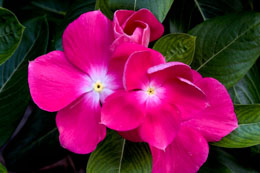Lovely delicate flowers that prefer shaded places, impatiens make great landscape flowers. Read more about them in this article.

The Impatiens' beauty lies in its thin and fine colored petals, which resemble natural silk. They give us a sense of freshness and genuine joy. Also, they can propagate quite fast and easy, so we can adorn plenty of places with them: balconies, window sills, and also our gardens, if we carefully observe certain growing rules.
Impatiens is one of the easiest to grow kind of houseplants. In the Romanian tradition, it is believed that this plant can bring good luck. It is also quite easy to groom and it comes in a variety of splendid colors with different sizes and structures. The name "Impatiens" probably suggests the plant's impatience to grow and bloom.
Impatiens should be planted at the beginning of spring. This can be done using a soil-filled tray for Impatiens seeds. These seeds are covered with a small quantity of soil. The tray is then kept in a warm dark place and when the first plants sprout, the tray is taken into the light but it should still be kept away from sun's direct light. When the new plants develop and get big enough, they are transplanted in pots. We must use big pots because this plant can grow very fast.
Like it has been previously mentioned, Impatiens does not require any special care. Nonetheless, it is necessary to take into account certain factors for this plant's proper care-taking.
Thus, the soil must be mixed with peat and it must also be properly fertilized. They don't like it if we use sand for the mixture. Impatiens prefers indirect lighting so it is best kept in a well-aired place (although it is high-temperature resistant, it feels best up to 20°C) and not far from the sun's light.
Impatiens also needs enough water, or if not, it may wither too fast and then die. One careless day is enough to create such disaster for the poor plant. These plants must also have a moist soil at any time, and mulch is compulsory for its care. The idea is that their soil must be permanently moistened. As long as their soil remains moistened, that is enough. It's good to add some liquid fertilizers to the water in summertime, because summer isn't the best season for this plant.
The propagation of this plant should best take place during summer, between the months of June-September. There are also many other things to be taken into account regarding their care.
Thus, too much sun can make this plant wither, so it's best to put in a shady spot where it can get about half or less of sunlight every day. Being less strong, the morning sun is the best for Impatiens.
Also, one should bear in mind that these plants don't come in all colors, only in some of them. Thus, there isn't any blue or yellow Impatiens, but there colors still can range from white to pink, salmon, orange, red, and so on. Some flowers are even bi-colored.
Still, from this plant species comes a new type of Impatiens called "New Guinea Impatiens." This type can take more sun than the usual kind but however, they still don't tolerate full sun. They look great in containers and on borders. As far as color and water preferences are concerned, they are the same as in the case of ordinary Impatiens. Nonetheless, they can be very good landscape plants if we provide them with moistened soil and some shade from the sun during the day. It can keep on blooming until the very first frost comes.
Another interesting fact about Impatiens is that they are edible plants. However, they are not so flavored and are not used too often in the kitchen, like most culinary flowers are.
Although they are mild perennials, Impatiens can be grown annually. Their means of propagation is by seeds or cuttings. Cuttings are the most efficient method of propagation. If you keep the soil moist and make the cuttings at regular intervals, you can fill plenty of space with these gorgeous little flowers. On the contrary, seeds can be very picky about growing conditions, and because of that the probability of plant propagation through seeding is quite low.
Enjoy them if you already have them, if not, take a close look at them next time and you'll fall in love with these delicate flowers!






 The Impatiens' beauty lies in its thin and fine colored petals, which resemble natural silk. They give us a sense of freshness and genuine joy. Also, they can propagate quite fast and easy, so we can adorn plenty of places with them: balconies, window sills, and also our gardens, if we carefully observe certain growing rules.
The Impatiens' beauty lies in its thin and fine colored petals, which resemble natural silk. They give us a sense of freshness and genuine joy. Also, they can propagate quite fast and easy, so we can adorn plenty of places with them: balconies, window sills, and also our gardens, if we carefully observe certain growing rules.